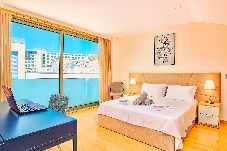-
Superbe maison de ville avec piscine...
Tavira
Type : Maison mitoyenne Capacité : 6 pers. Chambre : 3Dès : 127 € (par jour) -
Quinta Santhi / Cottage de campagne...
Moncarapacho
Type : Villa Capacité : 4 pers. Chambre : 2Dès : 115 € (par jour)
-
« Cabanas Getaway »/Penthouse...
Cabanas de tavira
Type : Appartement Capacité : 4 pers. Chambre : 2Dès : 74 € (par jour) -
Appartement Lindo/Salle à manger Patio...
Fuseta
Type : Appartement Capacité : 5 pers. Chambre : 2Dès : 98 € (par jour)
-
Appartement Jane/Duplex, avec piscine...
Tavira
Type : Appartement Capacité : 4 pers. Chambre : 2Dès : 50 € (par jour) -
Cabanas Nest/Cabanas Gardens avec...
Cabanas de tavira
Type : Appartement Capacité : 4 pers. Chambre : 1Dès : 65 € (par jour)






